Your ENFP Personality Type and Your Enneagram Type
Do you ever feel like the stereotypical descriptions of the ENFP type don’t apply to you? Do you feel like you relate to the cognitive function stack of the ENFP, but find some of the assumptions made confusing? While Myers-Briggs® can tell you how your mind works and how you’re mentally wired, the Enneagram can tell you how your childhood impacted you and what coping mechanisms you’ve developed. The enneagram can tell you what your core fear and desire is (although it may be relatively unconscious to you immediately). When we look at your personality type and the nine possible enneatypes that could pair with it, there’s a great opportunity to understand yourself better and more fully!
So let’s begin!
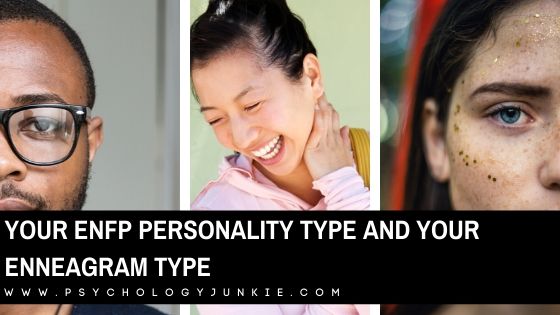
Not sure what your personality type is? Take our new personality questionnaire here. Or you can take the official MBTI® here.
Not sure what your enneagram type is? Take our new personality questionnaire here!
How Your Enneagram Type Influences Your ENFP Type
The ENFP Enneagram Type One – The Perfectionist
Basic Fear: Being corrupt, bad, or defective
Basic Desire: To be good, pure, and to have integrity
ENFP Ones have a strong sense of justice and right and wrong. These types are driven to explore ideas and possibilities that could improve the world. More proactive than many ENFPs, Ones will usually have a mental list of all the things they need to do before they can relax and explore and play. This can lead to them being more high-strung than most ENFPs. They often sense that there’s an “inner critic” inside them that berates them for every mistake they make. It’s important that they realize that this critical voice doesn’t belong to them, and it isn’t always on their side. Learning to forgive themselves for past mistakes (and forgive others) is a vital part of their personal growth.
As quintessential idealists, ENFP Ones spend many hours exploring their values, ideas of right and wrong, and actions. It’s vital to them to leave a positive impression on the world and lead a meaningful life. The unfortunate side of this idealism is that it can lead them to feeling constantly dissatisfied and disillusioned with a world that is corrupt.
Ones feel a constant sense of responsibility for the world around them. When ENFPs have the One enneatype they can seem more like Judgers than Perceiving types, because they are so fixated on accomplishing their tasks. They can also become irritated with people who lack ambition or drive. Because Ones are in the Anger/Instinct triad of the Enneagram, they tend to experience a lot of anger. However, rather than express their anger, they tend to repress it. It will typically come out in clenched fists, sarcastic comments, or self-righteous tirades about the world at large. It’s crucial for Ones to learn to express their anger right away rather than trying to hold it in, only to become sarcastic, critical, and stressed.
Unhealthy Ones Can Be: Judgmental, Self-Righteous, Critical, Perfectionistic, Bitter, Overworked, Hypocritical, Arrogant.
Average Ones Can Be: Driven, Purposeful, Serious, Pragmatic, Organized, Punctual, Irritable, Tense, Sarcastic, Opinionated, Hard-Working, Responsible, Dedicated.
Healthy Ones Can Be: Hopeful, Accepting, Wise, Discerning, Honest, Self-Aware, Humble, Playful, Creative, Joyful, Discerning.
The ENFP Enneagram Type Two – The Helper
Basic Fear: Being unworthy or unloved.
Basic Desire: To know they are loved for who they are.
Generous and empathetic, the ENFP Two is deeply concerned with the welfare and happiness of others. These types want people to feel comfortable around them and they strive to have a welcoming, affirming personality. They often attract people with their imagination. They often have lots of ideas of fun things to do and can generally see potential in people will encourage and inspire them. These are also the types who will show up with a hot meal when a friend is sick or be the first to offer to help in a dire situation.
Although ENFP Twos are typically generous and tactful, they can also struggle with a deep sense of loneliness. Many times they spend so much time giving to others that they fail to meet (or even recognize) their own needs. They may feel that nobody really knows them or loves them for who they are, merely what they do for them.
ENFP Twos often mistype as ENFJs because they exude the warmth and affirming qualities that are often associated with Extraverted Feeling (Fe). However, these types accept the affirming, harmony-centered priorities of the Two into their personal values, aligning it with their Introverted Feeling (Fi). They try to balance their need for individuality with a strong desire to gain intimacy and solidarity with others.
Because Twos are in the Shame/Heart triad of the enneagram, they tend to have issues with feeling worthless. They often feel that if they take time for themselves that they are being selfish or “bad.” On the flip side, they can also become prideful and arrogant – believing that other people couldn’t make it without their help. It’s crucial that ENFP Twos watch out for issues with codependency. Because they tend to take on the emotional needs of the people around them, they may get locked into unhealthy emotional dependency on others.
Unhealthy Twos Can Be: Victim-minded, meddling, co-dependent, manipulative, overbearing, gossiping, entitled, coercive, passive-aggressive, self-important, possessive.
Average Twos Can Be: Generous, selfless, people-pleasing, intrusive, sacrificial, prideful, insecure, welcoming, appreciative, warm, playful.
Healthy Twos Can Be: Unconditionally Loving, Supporting, Caring, Empathetic, Self-Aware, Self-Nurturing, Adaptable, Insightful, Generous, Enthusiastic.
Read This Next: 7 Struggles of the Enneagram Two Type
The ENFP Enneagram Type Three – The Achiever
Basic Fear: Being worthless without achievements
Basic Desire: To feel worthwhile and accepted for themselves
Driven and self-propelled, the ENFP Three chases after their ideas with gusto and enthusiasm. These types are filled with energy and optimism – looking for ways to transform the world around them and make it better. While many ENFPs are laid-back and easy-going, ENFP Threes tend to be highly industrious and productive. In fact, they can be so focused on achieving their goals that they burn themselves out in the process. It is especially important for Threes of this Myers-Briggs® type to pay attention to their physical needs. They often forget to drink enough water, eat enough food, or get enough rest because they’re so absorbed in the mental sphere.
The Intuition of the ENFP Three leads them in many different directions, and they tend to have a lot of projects happening all at the same time. Gaining independence and financial security is crucial to them. They enjoy that feeling of luxury and success that comes from buying a plane ticket to a far-off location or making a down-payment on a stately, impressive home. That said, they can become too fixated on impressing people and curating their outer persona, that they forget to delve into their Introverted Feeling side and hone in on their core values and identity. It’s frequent for ENFP Threes to get caught up in Ne-Te loops where their Intuition and Thinking sides bypass their Feeling side.
Because Threes are in the Shame/Heart triad of the Enneagram, they tend to have underlying issues with shame. They try to erase these feelings of shame by seeking success, accomplishment, and prestige. If they are unhealthy, this can deteriorate into attention-seeking, greed, and vanity. If they are healthy, they can be hard-working, inspiring to others, and full of joy and zest for life.
Unhealthy Threes Can Be: Deceptive, Self-Promoting, Grandiose, Narcissistic, Vindictive, Overly Competitive, Relentless, Opportunistic, Unprincipled, Vain, Superficial.
Average Threes Can Be: Hard-Working, Confident, Practical, Energetic, Image-Conscious, Expedient, Success-Oriented, Insecure, Arrogant.
Healthy Threes Can Be: Authentic, Inner-Directed, Adaptable, Helpful, Goal-Oriented, Self-Improving, Inspiring, Imaginative, Practical, Optimistic, Efficient.
Read This Next: 7 Struggles of the Enneagram Three Type
The ENFP Enneagram Type Four – The Individualist
Basic Fear: Having no identity or personal significance
Basic Desire: To find themselves and their significance
Insightful and deep, ENFP Fours are highly in tune with their Introverted Feeling side. Their hope is to find their significance, identity, and meaning in life and they will go to great lengths to do so. Introspective and creative, these Fours often have lush imaginary worlds inside their mind that they visit when life feels oppressive. They are usually highly intuitive and can see many possibilities where others would see none at all. That said, these types are prone to melancholy and often feel misunderstood. Unafraid to face their own darkness, ENFP Fours will honestly explain their scruples and weaknesses only to be alarmed when others fail to do so in return. It frequently feels to Fours that the world is full of show-offs and fakers who seem perfectly happy. Many Fours struggle with feelings of envy because they grapple so much with darker subjects and their own shame, whereas other types frequently avoid such things.
Individualistic and sensitive, the ENFP Four is a rebel at heart. If you demand that they do something, they’re more likely to do the opposite than to follow along. They hate labels, generalities, and phony behavior. More than anything they want someone to understand them and appreciate them for who they are rather than coercing them to fit in with the crowd.
Because Fours are in the Shame/Heart triad of the Enneagram, they tend to have underlying issues with Shame. But unlike the Three who tries to cover up their shame with a persona, the Four faces their shame head-on. They analyze their dark side, mourn their weaknesses, and secretly wish that someone could come along and nurture them and understand them for who they really are. Fours often struggle with feeling different, awkward, or self-conscious.
The Unhealthy Four Can Be: Self-Rejecting, Despairing, Self-Absorbed, Temperamental, Self-Indulgent, Depressed, Moralistic, Withdrawn, Moody, Inactive.
The Average Four Can Be: Warm, Intuitive, Empathetic, Self-Absorbed, Individualistic, Romantic, Decadent, Moody, Reclusive, Melancholy.
The Healthy Four Can Be: Compassionate, Introspective, Expressive, Life-Embracing, Sensitive, Creative, Original, Refined, Supportive, Creative, Insightful, Authentic.
Read This Next: 7 Struggles of the Enneagram Four Type
The ENFP Enneagram Type Five – The Investigator
ENFP Fives will often appear far more introverted than the typical ENFP. These types are data-junkies, driven to understand the world and chase their curiosity. They often see many different ways that a situation could develop and can be hesitant to put themselves out in the real world. Often, ENFP Fives are intelligent, intellectual, and perceptive. They store up knowledge and random facts in hopes that they will be able to deal with the world around them effectively. At healthy levels, this can make them persevering, realistic, and ingenious. At unhealthy levels, this can make them eccentric, distant, and more focused on accumulating data than doing anything with it.
Highly intuitive, ENFP Fives get absorbed in theoretical possibilities, ideas, and concepts. They often have rooms with half-read books, half-finished charts, and various projects scattered all around. Even though they are extroverts, they tend to guard themselves from too much socialization. They often feel drained by too much time with people because they’re so focused on chasing their ideas and theories. ENFP Fives are probably the most introverted-versions of the ENFP there are. However, they can come alive when they’re able to discuss their theories in-depth with people who are actually interested in them.
Because Fives are in the Head/Fear triad of the enneagram, they have underlying issues with fear. They may not realize it instinctively, however. Often, Fives run from their anxiety by accumulating knowledge and data. They separate themselves from their feelings and often identify with their thoughts instead. They may, in fact, become obsessed with various horrors and tragedies as a way of facing their fears. Maybe they’ll fixate on horror movies or dress up as a clown if they are afraid of such things. Unfortunately, this can lead to repressed terrors that comes back to haunt them in their dreams. It’s important for ENFP Fives to reach out and take action when they feel overwhelmed by fear or insecurity. It’s their natural tendency to distance themselves from others, but at their healthy levels, they are engaged with the world and willing to be vulnerable and connected.
Unhealthy Fives Can Be: Nihilistic, Arrogant, Stingy, Distant, Horrified, Extreme, Provocative, Eccentric, Negative, Critical, Unassertive, Self-Destructive.
Average Fives Can Be: Detached, Cynical, Ingenious, Self-Contained, Analytical, Intuitive, Sensitive (often hidden), Stubborn, Independent, Curious.
Healthy Fives Can Be: Participating, Wise, Original, Analytical, Sensitive, Objective, Realistic, Innovative, Focused, Insightful, Observant.
The ENFP Enneagram Type Six – The Loyalist
Core Fear: Being abandoned or without support
Core Desire: To find security and support
The ENFP Six has a great need for a sense of community and friendship. They often feel ambivalent about things – desperately craving independence while desperately craving the sense that they’re part of a group. They may fluctuate between trusting people whole-heartedly and testing them, checking to see that they can really be counted on. They may fall into deep insecurity about their relationships at times, especially if they are at an unhealthy level of growth.
Healthy ENFP Sixes tend to be deeply courageous, loyal, and supportive. They see ideas and possibilities that are negative, but they can also see a plethora of optimistic possibilities. They can help put people at ease and naturally understand when others are insecure are worried and know how to help them calm down. More than anything, these ENFPs crave a sense of a better, safer world. They desire a world where people feel supported and part of something bigger than themselves.
Sixes are in the Head/Fear triad of the Enneagram, which means ENFPs of this type will have underlying issues with fear. But unlike the Five who deals with fear by hoarding information, Sixes analyze their fear, face it head-on, and try to prepare for worst-case scenarios.
In childhood, Sixes often felt that their parents were unsupportive, inadequate, or distracted. Usually, during the separation phase of childhood, they felt like the stronger figure in the home was absent, weak, or emotionally unavailable. This led them to a lifetime of ambivalence and confusion. They felt that they didn’t know who they could trust, and this feeling prevailed into adulthood. Sixes crave closeness and intimacy, but also feel they must defend themselves against it. They might seem outwardly gentle and compliant, yet inwardly harbor cynicism and skepticism. It is typically very hard for them to trust.
Unhealthy Sixes Can Be: Panicky, Paranoid, Defensive, Rigid, Self-Defeating, Testy, Unpredictable, Controlling, Hypervigilant, Authoritarian, Blaming.
Average Sixes Can Be: Loyal, Caring, Warm, Dutiful, Ambivalent, Defensive, Responsible, Worried, Hard-Working, Planful, Witty.
Healthy Sixes Can Be: Caring, Helpful, Responsible, Practical, Compassionate, Loyal, Self-Reliant, Courageous, Engaging, Reliable, Cooperative, Supportive.
Read This Next: 7 Struggles of the Enneagram Six Personality Type
The ENFP Enneagram Type Seven – The Enthusiast
Basic Fear: Of being deprived and in pain
Basic Desire: To be satisfied, happy, and to have their needs fulfilled
Curious adventurers, Sevens are one of the most common Enneatypes for ENFPs. These types naturally see exciting possibilities everywhere. More than anything, they crave freedom and a sense of fun and enjoyment in life. Their spontaneous, charming nature often makes them popular and refreshingly youthful (no matter their age). ENFP Sevens chase their intuition down many adventurous new paths, bravely facing uncertainty with a “Seize the day!” mentality that inspires others.
Although Sevens can seem to “have it all” with their optimistic, fun-loving nature, they also are not devoid of pain. Yet unlike Sixes, who dwell on their fear and troubleshoot all the negative possibilities, Sevens avoid their pain and fear by chasing after excitement and distractions. Their minds are often humming with ideas, and they like to stay busy. This is in part because if they get bored they worry that their anxieties will bubble up to the surface. They’d rather ignore their anxiety than process it at average or unhealthy levels. When Sevens are healthy they allow themselves to be still and allow their deeper feelings and fears to become conscious. They are fully self-aware rather than distracting themselves before those fears simmer up.
In childhood, Sevens often felt disconnected from the maternal role in their life. As a result, they learned to nurture themselves and take care of their own needs. Through toys, games, distractions, and activity they found themselves distracting themselves to numb the pain of not being nurtured by the maternal figure in their life. That is why, even into adulthood, Sevens look for objects and distractions to help them repress feelings of separation, hurt, and pain.
Unhealthy Sevens Can Be: Insatiable, Hedonistic, Escapists, Reckless, Overwhelmed, Paralyzed, Narcissistic, Unfocused, Undisciplined, Materialistic, Self-Destructive.
Average Sevens Can Be: Restless, Impulsive, Consuming, Quick, Charming, Curious, Fun-Loving, Spontaneous, Enthusiastic, Distracted, Scattered, Self-Centered.
Healthy Sevens Can Be: Imaginative, Confident, Curious, Quick, Productive, Fun-Loving, Joyful, Satisfied, Anticipating, Enthusiastic, Realistic, Kind.
Read This Next: The Enneagram Type Seven – The Enthusiast Profile
The ENFP Enneagram Eight – The Challenger
Basic Fear: Being violated or controlled by others.
Basic Desire: To determine their own course in life. To protect themselves.
Strong-willed and protective, ENFP Eights crave a sense of autonomy and freedom more than anything else. They don’t like relying on other people and are willing to brave nearly anything to be in charge of their own lives. Along with craving freedom for themselves, they also feel a duty to create freedom for others. They can be very protective of vulnerable people and will go down fighting for the underdogs. Speaking up against injustice is something that ENFPs tend to do frequently. They have no problem being confrontational or aggressive if they sense that someone is trying to control them or others.
In childhood, Eights often felt that they had to be the “strong one” in their families. Often they felt that their parents were incompetent or unreliable, or their parents pushed them to be “tough” too excessively. As a result, Eights often have little sympathy for weakness or cowardice. They talk straight to people and appreciate when others talk straight to them. The ENFP influence on their type means that they are more quickly able to put themselves in another person’s shoes than some Eights would. They can be deeply empathetic towards people, but they also can’t abide stagnancy. They feel compelled to push people to be stronger, braver, and more resilient.
Because Eights are in the Gut/Anger triad of the Enneagram, they have underlying issues with Anger. However, unlike Nines who ignore their anger, they tend to embrace theirs. At unhealthy levels, they can be aggressive, violent, and confrontational. At healthy levels, they are protective, assertive, and willing to fight for what’s right.
Unhealthy Eights Can Be: Ruthless, Insensitive, Dictatorial, Domineering, Aggressive, Skeptical, Self-Centered, Controlling, Destructive, Violent, Self-Glorifying.
Average Eights Can Be: Direct, Energetic, Protective, Self-Confident, Earthy, Pragmatic, Enterprising, Competitive, Shrewd.
Healthy Eights Can Be: Direct, Heroic, Self-Reliant, Strong, Self-Confident, Leading, Loyal, Energetic, Protective, Selfless, Responsible, Patient.
Read This Next: Enneagram Eight Challenger Profile
The ENFP Enneagram Nine – The Peacemaker
Basic Fear: Loss, separation, or fragmentation.
Basic Desire: To have inner stability, harmony, and peace of mind.
ENFP Nines have an open, compassionate view of the world around them. They crave peaceful settings and a sense that everyone is getting along. Often spiritual seekers, ENFP Nines look for the profound and beautiful in everything around them. They are often in touch with nature and feel a sense of communion with the trees, animals, and people around them. Non-confrontational, Nines enjoy supporting people but can have a difficult time standing up for their own needs and desires. They may just walk away from a disagreement or admit defeat, even when they know they are right. At unhealthy levels of maturity, Nines tend to tune out problems and difficulties like a child listening to music to avoid their parents arguing. This can lead to laziness and obliviousness if it continues, but if Nines are healthy they can be deeply self-aware and cognizant of the things that need to be done.
In childhood, Nines learned early that the best way to handle turmoil in their environment was to “fade out” or disappear. They learned to dissociate from threatening or traumatic events and make themselves as low-maintenance as possible so they wouldn’t ruffle anyone’s feathers or make things worse. They felt that if they asserted themselves or became angry they would do nothing but create more problems. So they stayed in the background, repressed their true feelings and desires.
Because Nines are in the Gut/Anger triad of the enneagram they have underlying issues with anger. However, unlike Eights who express their anger, Nines repress it. They worry that if they express their true rage they will fragment and destroy all that they value. They manage their stress by downplaying their will and their desires. This can lead to passive-aggression, disappointment, and despair if they don’t grow and mature and learn to embrace their voice.
Unhealthy Nines Are: Oblivious, Repressed, Apathetic, Passive-Aggressive, Unassertive, Judgmental, Forgetful, Neglectful, Complacent.
Average Nines Are: Agreeable, Self-Effacing, Pleasant, Receptive, Diplomatic, Open-Minded, Disengaged, Resigned, Passive-Aggressive, Unassertive.
Healthy Nines Are: Peaceful, Generous, Patient, Diplomatic, Empathic, Open-Minded, Self-Possessed, Indomitable, Unselfish, Comforting, Imaginative.
What Are Your Thoughts?
Do you have any insights or tips for other ENFPs with your enneatype? Did this article reveal anything to you about yourself? Let us know in the comments!
Find out more about your personality type in our eBooks, Discovering You: Unlocking the Power of Personality Type, The INFJ – Understanding the Mystic, and The INFP – Understanding the Dreamer. You can also connect with me via Facebook, Instagram, or Twitter!



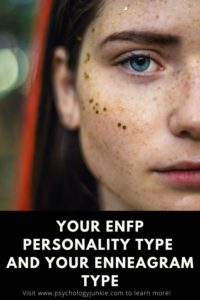
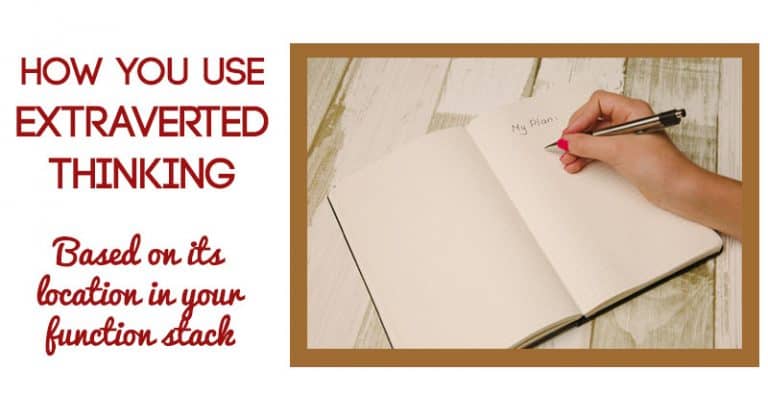
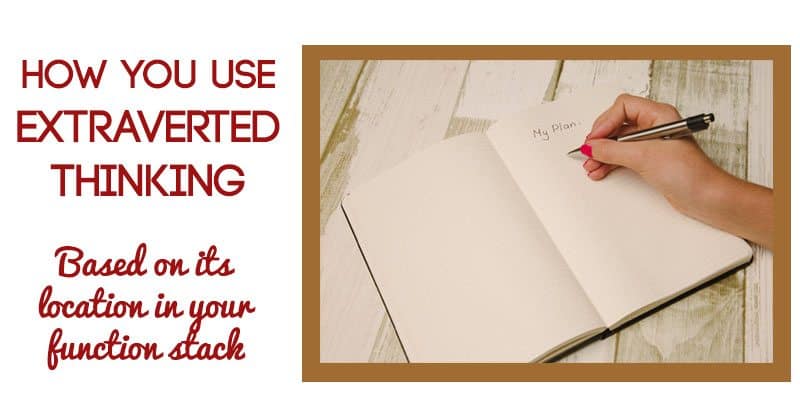


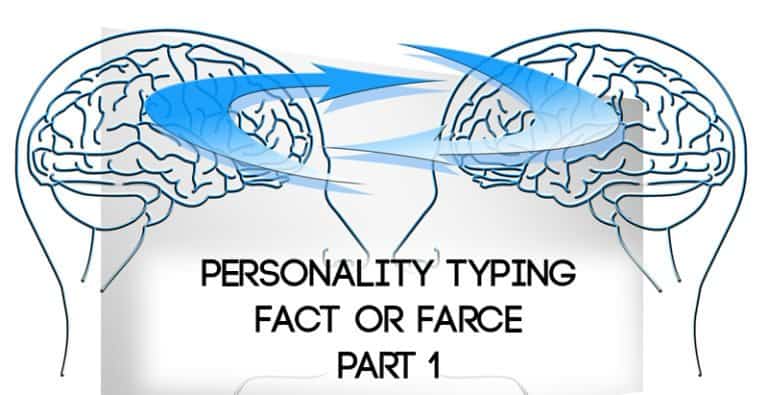
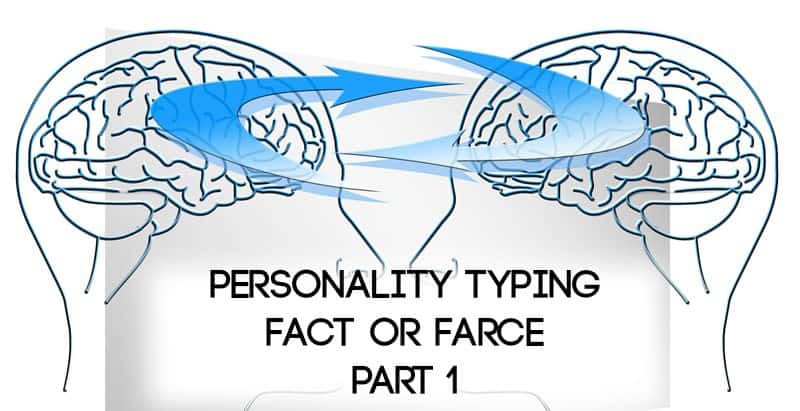
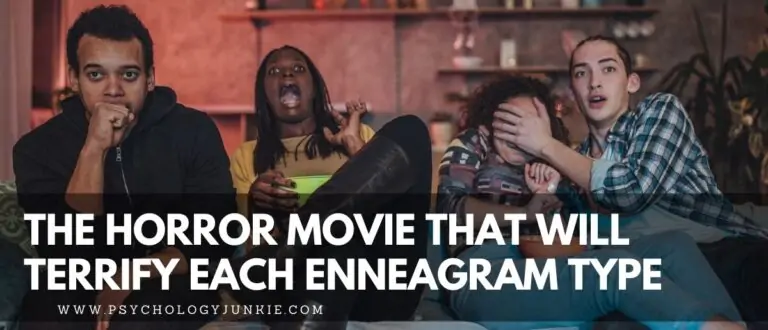
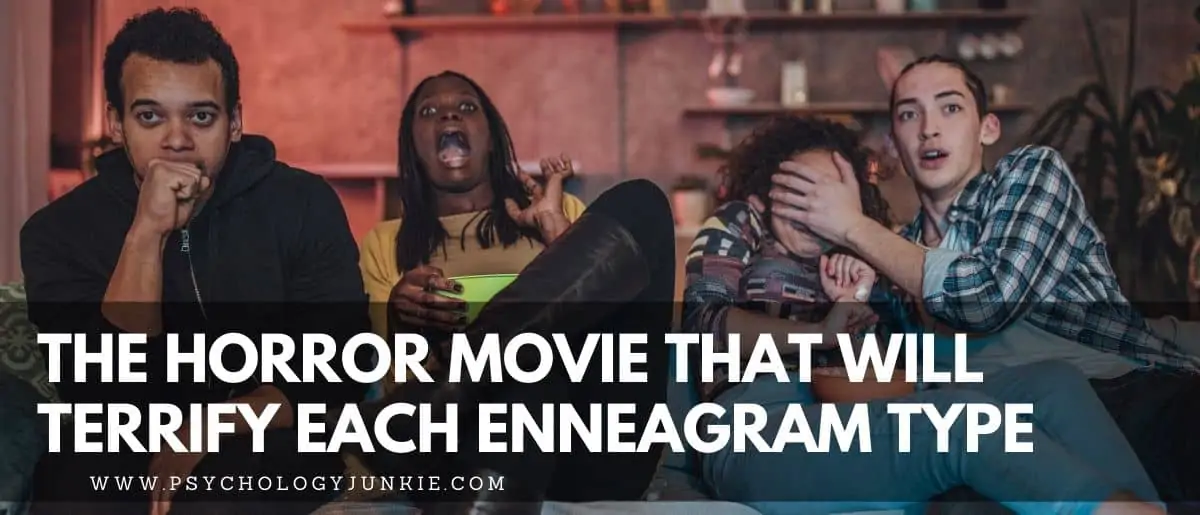


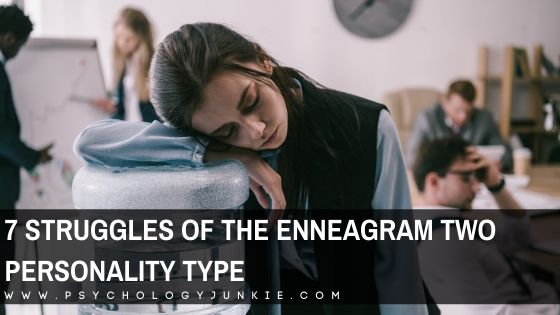
Love this! Can you do one for the infp? I am pretty sure that I am an infp and also a self preservation 2. The function stack of the infp is spot on, but the stereotypes make me doubt my type. Thanks!
Hi Lauren! We do have an article about the INFP. It’s right here: https://www.psychologyjunkie.com/2020/04/22/your-infp-personality-type-and-your-enneagram-type/
This is so spot on for me! It is actually hard to believe it is so accurate! Thank you for your great work and sharing it with the world!
I’m so glad that you enjoyed this Nancy! Thank you!!
Do you plan on doing one for ESTP? I’d find it really useful since my enneagram is often a source of confusion.
Absolutely! I’m planning on doing this for each of the Myers-Briggs types 🙂
Do you plan on doing one for ESFJ?
Yes! It’s taking me a while to get through them all, but I want to get one for each type 🙂
Can you do ENTP or INTP next please? I’m freaking out because people keep saying that I’m ENTP even though I relate and test as INFJ on almost every test I take. I’m also a 5w4 so I want to know if ENTP 5w4 are introverted and organized enough to test/mistyped as an IJ.
Yes! I’m hoping to get through all of the types – it’s just taking me a while to get them all written up 🙂
Yay!
I’m actually doing a similar project myself that’s also taking a while where I’m trying to get my entire family to take both the mbti and enneagram tests so I can make a family tree of all my family members and they’re personalities! I discovered some rare combinations so I’m excited to see what the rare combinations (ex: ENTJ 2, ENFJ 5, etc) are like!
This is such a great article. It really helped me figure out that I’m a core 2w1 (I loved the article about that type as well) and it also helped me figure out why, as an ENFP, I sometimes would wonder if I was really an ENFJ. All in all, your articles are so helpful and offer such great insights.